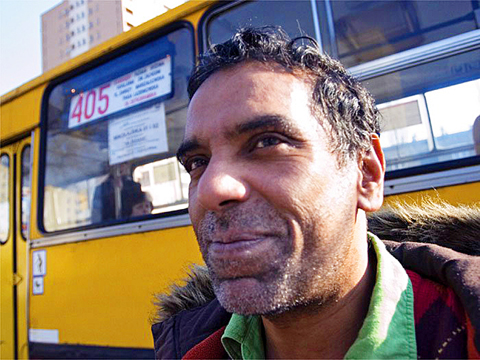A Briton said to have serious mental health problems was executed in China yesterday for drug smuggling despite last-minute pleas for clemency, a move condemned by London, rights groups and his family.
British Prime Minister Gordon Brown said he was “appalled and disappointed” by the execution of Akmal Shaikh, a 53-year-old father of three, who supporters say had bipolar disorder. His family expressed their grief and asked for privacy.
China confirmed the execution and defended its use of capital punishment as a deterrent, saying evidence of Shaikh’s mental illness was “insufficient.” It also said it hoped London would not “create new obstacles” to diplomatic ties.

PHOTO: EPA/LUIS BELMONTE DIAZ, REPRIEVE
However, the British Foreign Office summoned Chinese Ambassador Fu Ying (傅瑩) yesterday to protest the execution.
“She has been summoned,” a ministry spokeswoman said, adding that Britain would “reiterate” to her its condemnation of Shaikh’s execution.
Foreign Office minister Ivan Lewis, who had called in Fu on Monday night to make a last-ditch appeal for clemency, reiterated London’s charge that Shaikh’s medical condition was not taken into account.
“They never allowed a medical assessment to be done of him in the run-up to the decision to execute him. That is the bit that most causes us offence, in terms of the relationship between our two countries,” Lewis said.
“China needs to understand it will only ever achieve full respect around the world when it subscribes to basic standards of human rights,” he told Sky News TV.
“As long as that is not the case, that will always affect the perception of many people around the world of China and its place in the world,” he said.
Shaikh was the first European national to be executed in China in 58 years, the London-based charity Reprieve said. The group had been providing him with legal counsel.
His case sparked condemnation from London and rights activists, who said his illness should have been a mitigating factor in his sentencing.
Reprieve said China had ignored “overwhelming and unrebutted evidence” of his condition.
The execution was carried out in Urumqi by lethal injection, Xinhua reported.
Brown vented his anger, saying in a statement issued in London: “I condemn the execution of Akmal Shaikh in the strongest terms, and am appalled and disappointed that our persistent requests for clemency have not been granted.”
“I am particularly concerned that no mental health assessment was undertaken,” Brown said.
Shaikh, from London, was arrested in September 2007 in Urumqi after arriving from Tajikistan with 4kg of heroin. Campaigners say a criminal gang duped him into carrying the drugs into China.
He was sentenced to death last December and lost his final appeal earlier this year at China’s Supreme Court, officials say.
Two of Shaikh’s cousins visited him in Urumqi on Monday and told him of his fate. Reprieve said it was the first time he had seen a family member in two years.
The family issued a short statement expressing “grief at the Chinese decision to refuse mercy” and thanking Shaikh’s supporters, who created a Facebook group and staged a vigil in London on Monday.
Reprieve said it had medical evidence that Shaikh suffered from a delusion he was going to China to record a hit single that would usher in world peace. New witnesses have emerged to back that version of events.
One of those witnesses, Briton Paul Newberry, was quoted by Reprieve as saying Shaikh “was clearly suffering from delusions and it seemed to me he was a particularly severe case of manic depressive.”
Chinese Foreign Ministry spokeswoman Jiang Yu (姜瑜) reiterated that Shaikh’s rights had been “fully protected,” adding that China treated “criminals of all nationalities as equals” in its crackdown on the drugs trade.
A Hong Kong spokeswoman for Amnesty International, Roseann Rife, called the execution a “slap in the face of the international community” and said it showed Beijing’s “disregard for the rule of law.”
Amnesty says China executes more people every year than the rest of the world combined, but the actual numbers remain a state secret. Amnesty put the number of Chinese executions last year at more than 1,700.

Taiwan’s exports soared to an all-time high of US$61.8 billion last month, surging 49.7 percent from a year earlier, as the global frenzy for artificial intelligence (AI) applications and new consumer electronics powered shipments of high-tech goods, the Ministry of Finance said yesterday. It was the first time exports had exceeded the US$60 billion mark, fueled by the global boom in AI development that has significantly boosted Taiwanese companies across the international supply chain, Department of Statistics Director-General Beatrice Tsai (蔡美娜) told a media briefing. “There is a consensus among major AI players that the upcycle is still in its early stage,”

The Central Weather Administration (CWA) yesterday said it expected to issue a sea warning for Typhoon Fung-Wong tomorrow, which it said would possibly make landfall near central Taiwan. As of 2am yesterday, Fung-Wong was about 1,760km southeast of Oluanpi (鵝鑾鼻), Taiwan’s southernmost point, moving west-northwest at 26kph. It is forecast to reach Luzon in the northern Philippines by tomorrow, the CWA said. After entering the South China Sea, Typhoon Fung-Wong is likely to turn northward toward Taiwan, CWA forecaster Chang Chun-yao (張峻堯) said, adding that it would likely make landfall near central Taiwan. The CWA expects to issue a land

‘SECRETS’: While saying China would not attack during his presidency, Donald Trump declined to say how Washington would respond if Beijing were to take military action US President Donald Trump said that China would not take military action against Taiwan while he is president, as the Chinese leaders “know the consequences.” Trump made the statement during an interview on CBS’ 60 Minutes program that aired on Sunday, a few days after his meeting with Chinese President Xi Jinping (習近平) in South Korea. “He [Xi] has openly said, and his people have openly said at meetings, ‘we would never do anything while President Trump is president,’ because they know the consequences,” Trump said in the interview. However, he repeatedly declined to say exactly how Washington would respond in

Japanese Prime Minister Sanae Takaichi said yesterday that China using armed force against Taiwan could constitute a "survival-threatening situation" for Japan, allowing the country to mobilize the Japanese armed forces under its security laws. Takaichi made the remarks during a parliamentary session yesterday while responding to a question about whether a "Taiwan contingency" involving a Chinese naval blockade would qualify as a "survival-threatening situation" for Japan, according to a report by Japan’s Asahi Shimbun. "If warships are used and other armed actions are involved, I believe this could constitute a survival- threatening